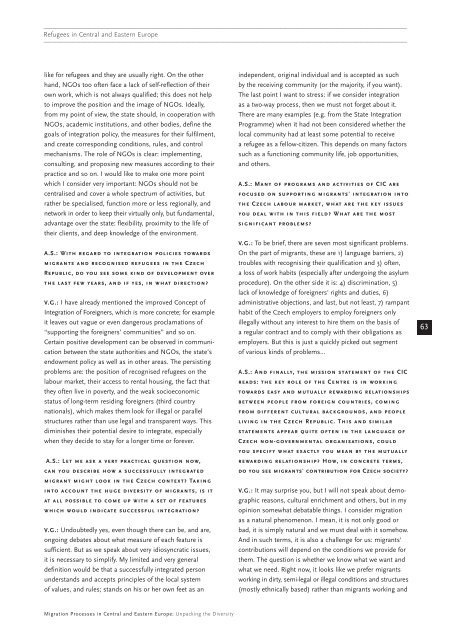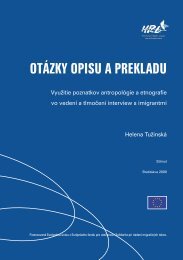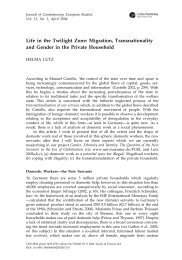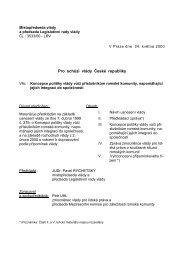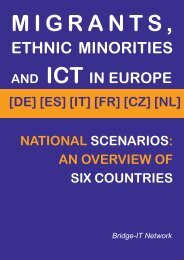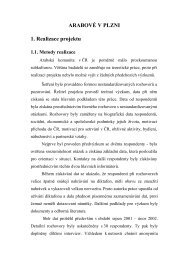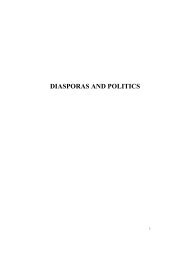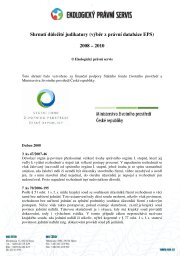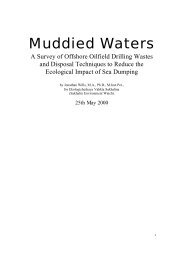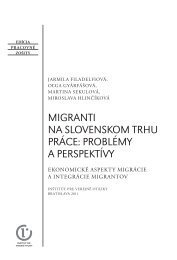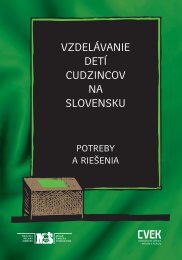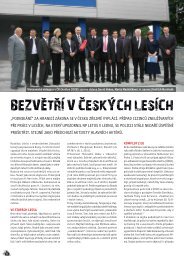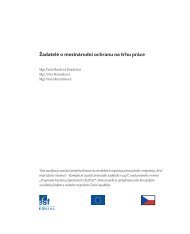Migration Processes in Central and Eastern Europe - Multiple Choices
Migration Processes in Central and Eastern Europe - Multiple Choices
Migration Processes in Central and Eastern Europe - Multiple Choices
Create successful ePaper yourself
Turn your PDF publications into a flip-book with our unique Google optimized e-Paper software.
———————————————————————————————————————————————————————————————<br />
Refugees <strong>in</strong> <strong>Central</strong> <strong>and</strong> <strong>Eastern</strong> <strong>Europe</strong><br />
———————————————————————————————————————————————————————————————<br />
like for refugees <strong>and</strong> they are usually right. On the other<br />
h<strong>and</strong>, NGOs too often face a lack of self-reflection of their<br />
own work, which is not always qualified; this does not help<br />
to improve the position <strong>and</strong> the image of NGOs. Ideally,<br />
from my po<strong>in</strong>t of view, the state should, <strong>in</strong> cooperation with<br />
NGOs, academic <strong>in</strong>stitutions, <strong>and</strong> other bodies, def<strong>in</strong>e the<br />
goals of <strong>in</strong>tegration policy, the measures for their fulfilment,<br />
<strong>and</strong> create correspond<strong>in</strong>g conditions, rules, <strong>and</strong> control<br />
mechanisms. The role of NGOs is clear: implement<strong>in</strong>g,<br />
consult<strong>in</strong>g, <strong>and</strong> propos<strong>in</strong>g new measures accord<strong>in</strong>g to their<br />
practice <strong>and</strong> so on. I would like to make one more po<strong>in</strong>t<br />
which I consider very important: NGOs should not be<br />
centralised <strong>and</strong> cover a whole spectrum of activities, but<br />
rather be specialised, function more or less regionally, <strong>and</strong><br />
network <strong>in</strong> order to keep their virtually only, but fundamental,<br />
advantage over the state: flexibility, proximity to the life of<br />
their clients, <strong>and</strong> deep knowledge of the environment.<br />
A.S.: With regard to <strong>in</strong>tegration policies towards<br />
migrants <strong>and</strong> recognised refugees <strong>in</strong> the Czech<br />
Republic, do you see some k<strong>in</strong>d of development over<br />
the last few years, <strong>and</strong> if yes, <strong>in</strong> what direction?<br />
V.G.: I have already mentioned the improved Concept of<br />
Integration of Foreigners, which is more concrete; for example<br />
it leaves out vague or even dangerous proclamations of<br />
“support<strong>in</strong>g the foreigners’ communities” <strong>and</strong> so on.<br />
Certa<strong>in</strong> positive development can be observed <strong>in</strong> communication<br />
between the state authorities <strong>and</strong> NGOs, the state's<br />
endowment policy as well as <strong>in</strong> other areas. The persist<strong>in</strong>g<br />
problems are: the position of recognised refugees on the<br />
labour market, their access to rental hous<strong>in</strong>g, the fact that<br />
they often live <strong>in</strong> poverty, <strong>and</strong> the weak socioeconomic<br />
status of long-term resid<strong>in</strong>g foreigners (third country<br />
nationals), which makes them look for illegal or parallel<br />
structures rather than use legal <strong>and</strong> transparent ways. This<br />
dim<strong>in</strong>ishes their potential desire to <strong>in</strong>tegrate, especially<br />
when they decide to stay for a longer time or forever.<br />
A.S.: Let me ask a very practical question now,<br />
can you describe how a successfully <strong>in</strong>tegrated<br />
migrant might look <strong>in</strong> the Czech context? Tak<strong>in</strong>g<br />
<strong>in</strong>to account the huge diversity of migrants, is it<br />
at all possible to come up with a set of features<br />
which would <strong>in</strong>dicate successful <strong>in</strong>tegration?<br />
V.G.: Undoubtedly yes, even though there can be, <strong>and</strong> are,<br />
ongo<strong>in</strong>g debates about what measure of each feature is<br />
sufficient. But as we speak about very idiosyncratic issues,<br />
it is necessary to simplify. My limited <strong>and</strong> very general<br />
def<strong>in</strong>ition would be that a successfully <strong>in</strong>tegrated person<br />
underst<strong>and</strong>s <strong>and</strong> accepts pr<strong>in</strong>ciples of the local system<br />
of values, <strong>and</strong> rules; st<strong>and</strong>s on his or her own feet as an<br />
<strong>in</strong>dependent, orig<strong>in</strong>al <strong>in</strong>dividual <strong>and</strong> is accepted as such<br />
by the receiv<strong>in</strong>g community (or the majority, if you want).<br />
The last po<strong>in</strong>t I want to stress: if we consider <strong>in</strong>tegration<br />
as a two-way process, then we must not forget about it.<br />
There are many examples (e.g. from the State Integration<br />
Programme) when it had not been considered whether the<br />
local community had at least some potential to receive<br />
a refugee as a fellow-citizen. This depends on many factors<br />
such as a function<strong>in</strong>g community life, job opportunities,<br />
<strong>and</strong> others.<br />
A.S.: Many of programs <strong>and</strong> activities of CIC are<br />
focused on support<strong>in</strong>g migrants' <strong>in</strong>tegration <strong>in</strong>to<br />
the Czech labour market, what are the key issues<br />
you deal with <strong>in</strong> this field? What are the most<br />
significant problems?<br />
V.G.: To be brief, there are seven most significant problems.<br />
On the part of migrants, these are 1) language barriers, 2)<br />
troubles with recognis<strong>in</strong>g their qualification <strong>and</strong> 3) often,<br />
a loss of work habits (especially after undergo<strong>in</strong>g the asylum<br />
procedure). On the other side it is: 4) discrim<strong>in</strong>ation, 5)<br />
lack of knowledge of foreigners' rights <strong>and</strong> duties, 6)<br />
adm<strong>in</strong>istrative objections, <strong>and</strong> last, but not least, 7) rampant<br />
habit of the Czech employers to employ foreigners only<br />
illegally without any <strong>in</strong>terest to hire them on the basis of<br />
a regular contract <strong>and</strong> to comply with their obligations as<br />
employers. But this is just a quickly picked out segment<br />
of various k<strong>in</strong>ds of problems...<br />
A.S.: And f<strong>in</strong>ally, the mission statement of the CIC<br />
reads: the key role of the Centre is <strong>in</strong> work<strong>in</strong>g<br />
towards easy <strong>and</strong> mutually reward<strong>in</strong>g relationships<br />
between people from foreign countries, com<strong>in</strong>g<br />
from different cultural backgrounds, <strong>and</strong> people<br />
liv<strong>in</strong>g <strong>in</strong> the Czech Republic. This <strong>and</strong> similar<br />
statements appear quite often <strong>in</strong> the language of<br />
Czech non-governmental organisations, could<br />
you specify what exactly you mean by the mutually<br />
reward<strong>in</strong>g relationship? How, <strong>in</strong> concrete terms,<br />
do you see migrants' contribution for Czech society?<br />
V.G.: It may surprise you, but I will not speak about demographic<br />
reasons, cultural enrichment <strong>and</strong> others, but <strong>in</strong> my<br />
op<strong>in</strong>ion somewhat debatable th<strong>in</strong>gs. I consider migration<br />
as a natural phenomenon. I mean, it is not only good or<br />
bad, it is simply natural <strong>and</strong> we must deal with it somehow.<br />
And <strong>in</strong> such terms, it is also a challenge for us: migrants'<br />
contributions will depend on the conditions we provide for<br />
them. The question is whether we know what we want <strong>and</strong><br />
what we need. Right now, it looks like we prefer migrants<br />
work<strong>in</strong>g <strong>in</strong> dirty, semi-legal or illegal conditions <strong>and</strong> structures<br />
(mostly ethnically based) rather than migrants work<strong>in</strong>g <strong>and</strong><br />
63<br />
<strong>Migration</strong> <strong>Processes</strong> <strong>in</strong> <strong>Central</strong> <strong>and</strong> <strong>Eastern</strong> <strong>Europe</strong>: Unpack<strong>in</strong>g the Diversity


